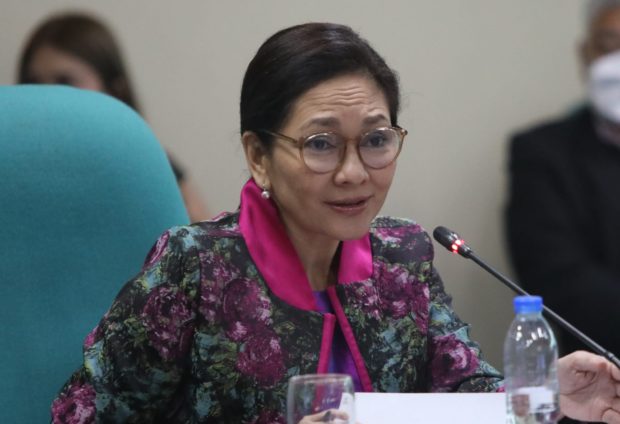Senate blue ribbon to investigate sugar imports again

Sen. Risa Hontiveros during one of the Senate hybrid hearings. (File photo from the Senate Public Relations and Information Bureau)
MANILA, Philippines — The Senate blue ribbon committee is set to launch another investigation of the controversy surrounding Sugar Order (SO) No. 6 amid suspicion that this was issued to justify the entry of a shipment of imported sugar six days before the supposed importation order.
Senate Resolution No. 497, filed by Sen. Risa Hontiveros, called on the Senate blue ribbon to conduct the probe barely six months after the same panel probed irregularities in an earlier sugar import order.
“(T)here is a need to investigate exactly how sugar shipments were allowed entry into our ports absent a Sugar Order and to identify gaps in policy that need to be addressed in order to effectively curtail agricultural smuggling and smuggling of regulated commodities like sugar,” Hontiveros said in her resolution.
SO6 will be the second Senate blue ribbon investigation on sugar importation under the administration of President Marcos, who is concurrent agriculture secretary and chair of the Sugar Regulatory Administration (SRA).
In August last year, the SRA was embroiled in another Senate blue ribbon investigation over SRA’s “unauthorized” release of SO4, which allowed the importation of 300,000 metric tons of sugar into the country.
Article continues after this advertisementThe Senate blue ribbon recommended the filing of graft and administrative charges against suspended agriculture Undersecretary Leocadio Sebastian and former SRA officials Hermenegildo Serafica, Roland Beltran, and Aurelio Valderrama Jr.
Article continues after this advertisementIt is believed the sudden exit of the then Executive Secretary Victor Rodriguez in September was also triggered by his alleged involvement in the issuance of an “illegal” sugar order.
Only 1 consignee
In her resolution, Hontiveros questioned the Feb. 9 arrival of a sugar shipment contained in 260 20-foot containers at the Batangas City Port aboard three vessels and using three shippers, all of which were reportedly consigned to All Asian Counter Trade Inc.
Six days later on Feb. 15, the SRA issued SO6, which allowed the importation of 440,000 metric tons of sugar, and which states that the SRA will only begin accepting applications for five calendar dates from the date of effectivity of the order, or until Feb. 18.
The senator said the SRA decreed that it will award the allocations to importers for five calendar days after the deadline for applications to import.
Given the timelines of the import order, the earliest date for the arrival of the sugar shipment under SO6 should have been March 1, Hontiveros said.
“If there are identified individuals involved in this fiasco, then the Senate should recommend charges of violation of Republic Act No. 10845, or the Anti Agricultural Smuggling Act, and/or Republic Act No. 3019, or the Anti Graft and Corrupt Practices Act,” she said.
She also cited the grumblings among other stakeholders in the sugar industry who purportedly raised questions of “equity and fairness” in SO6, including how the Department of Agriculture (DA) supposedly approved the volume of import allocation without any restriction.
“[They followed] no criteria, no ceiling, no formula with which to determine how the allocation is given to each importer,” she said.
Hontiveros cited information from “insiders” that three listed importers — All Asian Countertrade, Sucden Philippines Inc. and Edison Lee Marketing Corp. — at least two of these have purportedly received letters from the DA granting them authority to import sugar at specified quantities as early as Jan. 13.
The senator questioned this move by the DA, as she pointed out that the mandate to authorize sugar importation is with the SRA.
She also raised concern that SO6 grants “unprecedented discretion” to the DA to waive the payment of performance bond, purportedly on grounds that are “broad and subject to generous interpretation.”
“At a time of high prices and sugar shortages it is imperative to review policies that allow the favoring of powerful players and importers and create virtual monopolies on basic commodities,” she said.